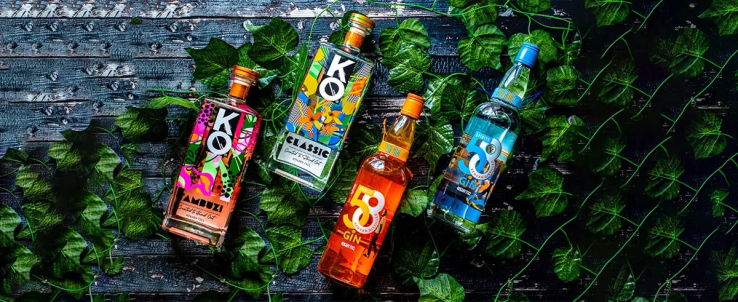The Scoop
Nairobi-based alcohol startup African Originals faces regulatory hurdles that threaten to push it out of the Kenyan market following a dirty tricks campaign it alleges has been waged by Diageo subsidiary East African Breweries Limited (EABL).
The seven-year old startup is known for its “Kenyan Originals” range of ciders, gins, and iced teas. EABL, the region’s largest brewer, launched a competing range of ciders in December last year. Since then, African Originals claims to have faced a barrage of challenges it blames on EABL, prompting it to hire a team of U.K.-based legal advisors this year.
A letter seen by Semafor Africa dated Feb. 19, sent by African Originals to Diageo’s general counsel in London, laid out the allegations in their dispute. African Originals described EABL’s new range of fruit ciders as a “direct copy” of its products. It also claimed EABL staff had maligned their products, and incentivized supermarket workers not to display their products, citing specific incidents at two supermarkets in Nairobi.
African Originals also questioned the origins of viral tweets in January from users that alleged they became ill after consuming their products. The company claims the tweets are linked to Wowzi, a Nairobi-based platform which connects companies with social media influencers. EABL has previously worked with Wowzi “to partner with nano-creators to effectively connect to consumers in an authentic way,” according to a testimonial on the Wowzi website. Wowzi was selected for Diageo’s inaugural cohort of its growth acceleration program in January.
“We are ready and willing to compete with EABL on merit through the quality and prices of our products but we are not prepared to suffer serious commercial harm as a result of their smear campaign,” African Originals chairman Henry Rudd wrote in the letter.
EABL did not immediately respond to emails or phone calls from Semafor Africa requesting their comments on the allegations.
A legal firm representing Wowzi, in a letter to Semafor Africa, said the claims made about the company were “egregiously false and untrue.”
Know More
The company’s problems were compounded two weeks ago when the Kenya Revenue Authority (KRA) suspended its production license and sealed its spirits line, rendering it unable to produce or sell some products. The company said it was informed that the decision was tied to a wider ongoing government crackdown on illicit liquor.
KRA did not immediately respond to queries from Semafor Africa.
African Originals was founded by British executive Alexandra Chappatte in 2017 after she left her job as head of marketing for alcoholic beverages giant Pernod Ricard in West Africa. It has attracted investors including Phoenix Beverages, Mauritius’ largest brewer which acquired a 28.15% stake in the company in February.

EABL is the third-largest company on the Nairobi Securities Exchange (NSE) by market cap and employs around 1,500 people. Its brands include the iconic beer Tusker, and it also sells other global Diageo brands including Guinness, Johnnie Walker and Smirnoff. The company has previously been accused by competitors in Kenya of abusing its dominance. In 2020, multiple senators accused the company of engaging in restrictive trade practices. The company has consistently denied these allegations.
Martin’s view
The handling of African Originals by KRA and the Kenya Bureau of Standards (KEBS) is what will ultimately determine the company’s future in the country. Major regulatory hurdles would make it impossible for the startup to effectively compete with EABL.
African Originals CEO Alexandra Chappatte told Semafor Africa that the stripping of its production license is one of the only scenarios that could see the company exit the Kenyan market. This wouldn’t be ideal for Kenya for multiple reasons — the company sources all its fruit from local farmers, creates jobs and has a brand that is heavily tied to the country.
Even if it does survive, it will have to compete with a far larger player in EABL, which has historically dominated emerging competitors including Keroche, Kenya’s second-largest brewer.
Keroche co-founder Nakuru Senator Tabitha Karanja has repeatedly accused EABL of illegal and unethical practices. Most recently, Keroche was among beer distributors and makers that took legal action against EABL for allegedly buying up beer bottles on the market and embossing them to limit rival beer makers’ access to bottles. EABL won the dispute on a legal technicality.
Chappatte told me Kenya remains the focus of African Originals for the next three years with “over 90% of our revenues planned to derive from Kenya should we be able to operate freely.”
Room for Disagreement
EABL developed an internal competition compliance policy to ensure it does not engage in restrictive trade practices in a deal struck with Kenya’s Competition Authority in 2019. The brewer has also been on the winning side of disputes over alleged restrictive trade practices, including in 2021 when the High Court dismissed the case by beer distributors who accused it of violating the Competitions Act.
The View From the KRA
The Kenya Revenue Authority (KRA) disclosed on Mar. 7 that it had intensified surveillance of alcohol manufacturers as part of a new government crackdown on illicit liquor. KRA Commissioner General Humphrey Wattanga told the Senate that its officers would be deployed to alcohol manufacturing plants to support compliance and enforcement efforts including disclosing any irregularities and discrepancies.
“The Excise Duty regulations allow us to station our officers at factories producing excise tax-covered goods such as beer, wines and spirits, cigarettes, mineral water, soft drinks, juices among others,” he noted. President William Ruto has directed KRA to pull licenses of importers of illicit alcohol in Kenya as part of his administration’s plan to combat alcoholism in the country.


